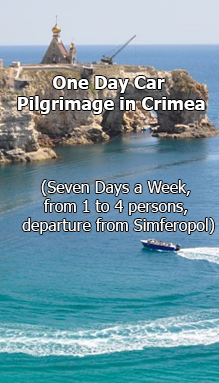Yalta
Yalta is a significant resort and cultural centre. It stretches along the Southern Coast of Crimea. In 1837 it was turned into a district city. Now the city territory incorporates land from Ayu-Dug to the Sarych Cape.
Greater Yalta is a 70-km stretch of the South Crimean coast washed by the Black Sea. Ayu-Dug (Mount Bear) is a signpost to Greater Yalta. To the east from Yalta there are Gurzuf, the Nikita Botanical Gardens and Massandra.
The resorts to the west are Livadia, Oreanda, Miskhor, Koreiz, Gaspra, Alupka and Simeiz.
A snow-white city lies inside the large shell formed by a semicircle of mountains. Yalta is beautiful in her mountain setting, she is open only to the sea and the sun.
The cypresses with cones like little bells have already become a symbol of the resort. Magnificent magnolia trees fill the air with their perfume. And the sea adds the finishing touch to all this beauty.
Yalta originated at Polikur Hill. Polikur (Paleokhor), means in Greek “Old Place”. Yalta is the only port on the Crimea’s southern shore which can safely shelter ships in a storm. The talented engineer A. Bertier-Delagarde supervised the construction of the Yalta mole in 1889–1892.
The oldest street in the city is Roosevelt Street. It named in honour of the outstanding statesman, US President Franklin Roosevelt (1882–1945), who visited Yalta in February 1945.
Yalta’s main street is the Embankment. It is a favourite avenue of holiday-makers. The Embankment is lined with shops, cafes, and restaurants. There is the oldest Hotel Tavrida, which was built in 1875. The great Russian poet Nickolai Nekrasov lived here in room 68. He wrote part of his long poem “Who Can Be Happy in Russia?” in Yalta. In Yalta there is a cablecar line. It leads to the top of Darsan Hill and the Mound of Glory.
The second half of the Embankment includes the Municipal Park and the Anton Chekhov Drama Theatre. In 1900 the Moscow Art Theatre gave tour performances. The members of the company came to show the sick Chekhov his play the “Seagull”. The great Fyodor Chaliapin (1873–1838) sang on this very same stage, accompanied by Sergey Rakhmaninov (1873–1943).
In the house across the theatre lived the outstanding Ukrainian poetess Lesia Ukrayinka (1871–1913). A bronze statue has been set up in her memory right in front of the house.
Yalta is home of two main parks — Primorsky (Seaside) and Massandra.












